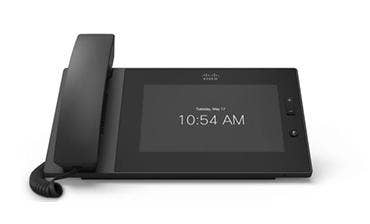Cisco Meraki Explodes Into The Voice Market, Targeting SMBs

Partners say other purveyors of voice systems are in for a rude awakening as Cisco expands its cloud-based management Cisco Meraki portfolio into a new phone system targeting the SMB market -- giving channel partners a new source of recurring revenue.
"Now with a Meraki voice system in place, you have a product that's less expensive even than the traditional SMB market players ... less expensive to install, manage, and easier to use and operate for that SMB business," said Phil Mogavero, vice president of Advanced Technology Group network solutions and regional chief technology officer at El Segundo, Calif.-based PCM, -- a $1.6 billion solution provider and Cisco partner. "So Cisco, between Meraki voice and [Cisco] Spark, now has really provided a one-two punch to be able to tackle that SMB marketplace."
The San Jose, Calif.-based networking giant Tuesday unveiled its cloud-managed communications system: the Meraki MC74. The MC74 phone system has a touch-screen display that is managed through the same single pane of glass as the rest of the Meraki networking infrastructure solution. The MC74 hardware is now available in the U.S. market with a list price of $599, along with a one-, three- or five-year cloud license.
[Related: Survey: Networking VARs Weigh In On Cisco's Hyper-Converged, SDN, Software And Security Strategies]
Pablo Estrada, director of Cisco's Cloud Networking Group, said Meraki's shift to phones is because of the "extremely high growth and demand" Cisco is seeing from its current 120,000 global Meraki customers.
"Why go this direction for the Meraki team? … Because customers are saying, 'When are you going to build a phone? Because we'd love to manage our phones through that same model as well,' " said Estrada in an interview with CRN. "Adding on communications is an absolutely natural fit for Meraki."
In 2012, Cisco acquired cloud-based network provider Meraki for $1.2 billion. The company initially sold Cisco Meraki cloud-managed Wi-Fi, but the business has since expanded to the point that now 52 percent of revenue comes from switching and security products, while 48 percent is from wireless. Cisco Meraki has an annual run rate of $1 billion, according to the company.
During Cisco's third fiscal quarter earnings call last week, CEO Chuck Robbins said Meraki stands out as an "excellent example of how we have begun to scale our enterprise networking into a subscription model."
Advanced Technology Group's Mogavero said SMB customers today want everything in their IT environment cloud-managed for them so they can become more efficient and profitable.
"As we look at the small and midmarket businesses, they just don't have the resources to run and manage their infrastructure," said Mogavero. "So moving to a cloud-managed environment suits [them] well. Specifically, Meraki has found an excellent niche in the marketplace, which is the easy-to-use, easy-to-install, zero-footprint [solution], from a management perspective, yet strong visibility from an IT operations perspective. They've kind of cracked the code in that area and developed a solution that's very, very easy for small and midmarket [businesses] to run and to use."
The new communications system opens up the door for partners to sell a whole new product category to existing Meraki customers or expand the number of customers and the footprint partners can touch. Cisco says it's enabling channel partners to capture new recurring revenue opportunities surrounding Meraki.
"This really cements the expansion and transition from a solution that was just managed Wi-Fi, then expanded to cloud-managed networking, and is now really cloud-managed IT," said Cisco's Estrada.
In addition to the new communications system, Cisco also expanded its Meraki wireless and switching product lines with a pair of new indoor wireless 802.11ac Wave 2 access points and cloud-managed switches.
Cisco's new MR52 and MR53 access points have 4x4 antennas; are available in 20, 40, 80 and 160MHz channels; and enable Beacon engagement and Bluetooth LE scanning. The MR52 has dual 1-gigbit interfaces with a list price of $1,399, while the MR53 is multi-gigabit at a price of $1,699.
"The multi-gigabit allows you to push more data over the same Ethernet cable infrastructure," said Cisco's Estrada. "Wave 2 is really designed to allow a Wi-Fi access point to deliver multiple streams of data to multiple clients simultaneously -- that enables organizations to have additional capacity and support higher-density deployment."
Cisco also unveiled Tuesday its MS350-24X Layer 3 switch -- a new 24-port addition to the MS350 family, with 8 multi-gigabit ports of 1/2.5/5/10G. It was designed to work with the new MR53 access point and comes in at a list price of $7,495.
The other new Cisco switch is the MS425, with 16 and 32 ports of 10/40G along with flexible stacking. "Those are ports designed to take all this additional capacity and distribute it to other parts of the LAN or if it's going even further upstream as well," said Estrada. The list price for the MS425 with 16 ports is $14,000, while the MS425 with 32 ports is $22,000.